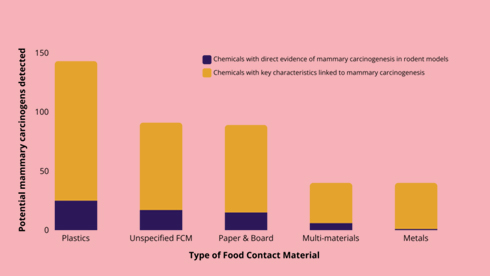
Regulatory Gaps: Nearly 200 Potential Mammary Carcinogens Found in Food Contact Materials, Finds Study
A recent study found nearly 200 possible breast carcinogens in food contact materials (FCMs), including plastics and paper, raising worries about widespread public exposure despite existing safety restrictions. The Food Packaging Forum conducted the study, which highlights the urgent need for greater preventative measures to reduce the prevalence of hazardous chemicals in daily items.
Researchers compared data from the Food Packaging Forum's FCCmigex Database with the Silent Spring Institute's list of potential breast carcinogens and found 189 suspected mammary carcinogens in food contact materials, of which 143 were detected in plastics and 89 in paper-based materials.
"This study is important because it shows that there is a huge opportunity for prevention of human exposure to breast cancer-causing chemicals," said Jane Muncke, Managing Director of the Food Packaging Forum and co-author of the study. "The potential for cancer prevention by reducing hazardous chemicals in your daily life is underexplored and deserves much more attention."
Despite rules intended to limit the use of genotoxic carcinogens in FCMs, the study identifies major gaps in present regulatory regimes. Markets with strict regulations, such as the European Union and the United States, still detect these compounds in FCMs. According to Lindsey Parkinson, main author of the report and data scientist at the Food Packaging Forum, the problem is widespread.
"Identifying the presence of these hazardous chemicals in food contact materials was possible thanks to our FCCmigex Database," according to Parkinson. "This resource brings valuable information from thousands of published scientific studies on chemicals in food contact materials together into a single and easily explorable place."
The study's most concerning finding comes from research conducted between 2020 and 2022. Migration experiments, which simulate real-world situations, revealed evidence of exposure to 76 potential maternal carcinogens from food contact materials obtained globally. An astounding 61 of these compounds, or 80%, came from plastics. The researchers caution that this reflects the population's continuous exposure to these hazardous compounds under normal operating settings.
"Our findings imply that chronic exposure of the entire population to suspected mammary carcinogens from FCMs is the norm and highlights an important but currently underappreciated opportunity for prevention," according to the research's authors.
The report advocates for increased regulatory monitoring, emphasizing the importance of better implementing existing regulations and developing more extensive testing procedures. The researchers propose that the current emphasis on regulating genotoxic carcinogens is inadequate, and they recommend considering additional carcinogens, including those with non-genotoxic mechanisms.
As the world population continues to be exposed to these hazardous substances, the study calls for stricter safety measures and increased public awareness to limit the hazards associated with food contact materials.